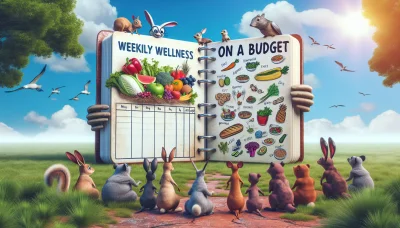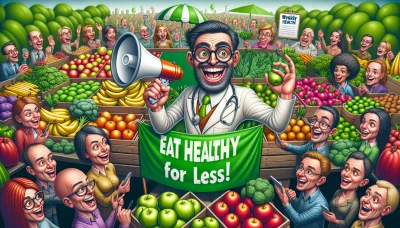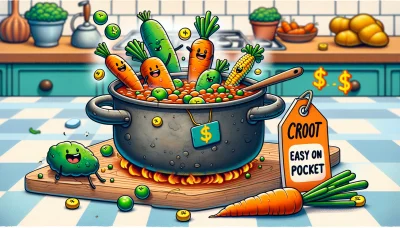Healthy Wednesday Discussion Continuation Quiz
Test Your Knowledge
Question of
Healthy Wednesday Discussion Continuation: The Importance of Healthy Eating
Healthy Wednesday is a dedicated weekly event that emphasizes the significance of maintaining healthy eating habits. It serves as a platform for sharing knowledge, experiences, and strategies related to nutrition and diet. The initiative aims to inspire individuals and communities to make informed food choices, understanding the vital role that nutrition plays in overall health and well-being. By focusing on the benefits of a balanced diet, Healthy Wednesday encourages a holistic approach to health, fostering a supportive environment for positive lifestyle changes.
Benefits of Healthy Eating
- Improved energy levels
- Better heart health
- Weight management
Common Myths About Healthy Eating
When it comes to healthy eating, misinformation abounds. Many beliefs we hold about dieting and nutrition are based more on hearsay and outdated science than on current evidence. It's crucial to debunk these myths to make informed choices about our health and well-being. Understanding the truth behind these misconceptions can lead to better dietary habits and a healthier lifestyle overall.
- Myth: Fat is bad for you. Truth: Not all fats are created equal. Healthy fats, like those found in avocados, nuts, and olive oil, are essential for heart health and brain function.
- Myth: Carbs make you gain weight. Truth: Complex carbohydrates, such as whole grains, fruits, and vegetables, are vital for energy and should not be cut out of your diet.
- Myth: Eating after 8 PM causes weight gain. Truth: It's not when you eat, but the total calories consumed versus burned that affects weight gain.
- Myth: All calories are the same. Truth: The source of calories matters. 100 calories of vegetables can have a very different effect on your health than 100 calories of candy.
- Myth: Diet foods are always a healthier option. Truth: Many diet products are low in fat but high in sugar and can be more harmful than their regular counterparts.
- Myth: Skipping meals helps you lose weight. Truth: Missing meals can actually slow down your metabolism and lead to overeating later on.
5 Simple Tips for Incorporating Healthy Foods into Your Diet
- Start by adding one serving of fruits or vegetables to every meal. This can be as simple as a banana with breakfast or some carrots with lunch.
- Swap out refined grains for whole grains. Instead of white rice or bread, opt for brown rice, quinoa, or whole wheat bread.
- Make water your go-to beverage. Replace sugary drinks with water or herbal teas to reduce calorie intake and stay hydrated.
- Plan your meals and snacks ahead of time. Preparing healthy options in advance can prevent reaching for unhealthy fast food when you're hungry.
- Incorporate lean proteins into your diet, such as fish, poultry, beans, and legumes, to keep you feeling full and satisfied.
Understanding Nutritional Labels
Reading and understanding nutritional labels on food products is crucial for making informed dietary choices. These labels provide essential information about the nutritional content of food items, helping individuals manage their calorie intake, balance their diet, and avoid or limit certain ingredients based on health conditions or dietary restrictions. By familiarizing oneself with the components of nutritional labels, consumers can make healthier food selections that contribute to overall well-being.
- Serving Size - Indicates how much of the food is considered a single serving, which is vital for accurately assessing the nutritional content.
- Calories - Provides information on the amount of energy derived from a serving of the food.
- Fats - Includes details on total fats, saturated fats, and trans fats, which are important for heart health.
- Sodium - Shows the amount of sodium per serving, crucial for blood pressure management.
- Sugars - Includes added sugars and total sugars, helping to manage sugar intake.
- Protein - Indicates the amount of protein per serving, essential for muscle repair and growth.
- Vitamins and Minerals - Provides information on essential nutrients, such as Vitamin D, Calcium, Iron, and Potassium.
Healthy Eating on a Budget
Maintaining a healthy diet while sticking to a budget can seem challenging, but it's entirely possible with the right strategies. By planning meals, shopping smart, and making mindful choices, you can enjoy nutritious meals without overspending. The key is to prioritize whole foods, reduce waste, and get creative in the kitchen. With a bit of preparation and knowledge, eating healthily on a budget can become an enjoyable and sustainable part of your lifestyle.
- Plan your meals for the week and make a shopping list to avoid impulse buys.
- Buy in bulk when possible and choose whole foods over processed options.
- Shop for seasonal produce to get the best deals and flavors.
- Use coupons and take advantage of sales, but only for items you were already planning to buy.
- Prepare meals at home and limit dining out to save money and control ingredients.
- Freeze leftovers or use them in creative ways to reduce food waste.
- Grow your own herbs and vegetables if you have the space, even a small garden can save money.
- Consider plant-based proteins like beans and lentils, which are often cheaper than meat.
Conclusion: Embracing Healthy Eating for Life
As we wrap up our Healthy Wednesday discussions, it's crucial to remember that the journey towards better health does not end here. Embracing healthy eating is not just a temporary change but a lifelong commitment to nurturing our bodies with the nutrients they need. Let's carry forward the insights and inspiration from our discussions, making mindful choices each day. Encourage one another to stay on this path, for it is together, with sustained effort and determination, that we can truly transform our health and well-being for the better. Commit to this journey of healthy eating, and let's make every day a step towards a healthier, happier life.












